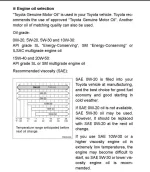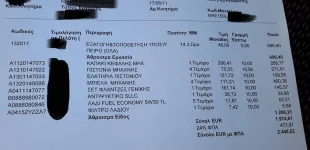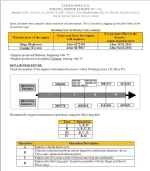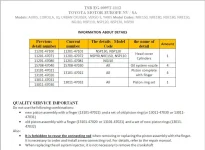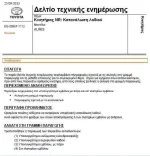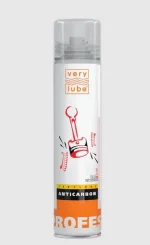Picked up a 2012 Yaris with the 1NR-FE 1.33L engine with no service history at 80k miles - took a gamble at a low price, its probably had some maintenance throughout its life, but it was a recovered vehicle so the paperwork was lost at some point.
I've done an initial oc using Shell Helix Ultra 5w30 AF which meets API SL, ACEA A5/B5, Ford WSS-M2C913-C & WSS-M2C913-D which leads me to believe that this is a "thin" 5w30 - though forgive me I am still quite the noob at this (this is a readily available cheap oil in the UK)
The car feels a little bit sluggish to accelerate and doesn't rev as freely as I think it should, and I found this post:
https://bobistheoilguy.com/forums/threads/oil-for-toyota-1nr-fe-stop-start.161867/
and this comment by the same user:
https://bobistheoilguy.com/forums/threads/who-is-buying-toyota-0w-20.173635/post-2590823
Trying to decide how to go about a reduced OCI...
Toyota dealers in the UK seem to universally stick Toyota branded 5w30 in anything that comes through the door (may not be the case for the newer hybrids), but I've just ordered a service kit for my Lexus GS450H and they've given me 5w30 for that as well so that probably isn't an option.
I have also read elsewhere that the 1NR engine is prone to piston rings getting gummed up and thus causing oil consumption, its too early to tell, but my oil level may have dropped slightly since I changed it (could be I just didn't set the level as high as I thought I did), but if that's the case, I plan to soak the cylinders in engine oil flush (seen good results with LiquiMoly - despite what people say on this forum), remove the flush and also do a crankcase flush and drain, removing the sump if necessary. Then continue to do a short OCI for a few k miles.
Question is, what oil to use, considering that Toyota OEM oil is sometimes Mobil1, Eneos, Idemitsu etc. and the genuine bottles don't give anything away, I have got the impression that their oil is a fairly average oil sold at a premium.
I've come across Motul 8100 Eco-Lite 0w20 which is available at a relatively reasonable price, compared to OEM at least, I've also used Millers and Comma 0w20 oils in our Suzuki which are well regarded by professionals, but don't really have many approvals or independent testing.
I'm also finding a lot of ACEA C5 low viscosity oils that have lots of Volvo approvals and some of them say that they are ONLY for use in Volvos lol.
Wondering if anyone has any thoughts on insight into this situation?
I'm still not at a level where I am able to fully interpret PDS and the numbers of different oils, sorry.
I've done an initial oc using Shell Helix Ultra 5w30 AF which meets API SL, ACEA A5/B5, Ford WSS-M2C913-C & WSS-M2C913-D which leads me to believe that this is a "thin" 5w30 - though forgive me I am still quite the noob at this (this is a readily available cheap oil in the UK)
The car feels a little bit sluggish to accelerate and doesn't rev as freely as I think it should, and I found this post:
https://bobistheoilguy.com/forums/threads/oil-for-toyota-1nr-fe-stop-start.161867/
and this comment by the same user:
https://bobistheoilguy.com/forums/threads/who-is-buying-toyota-0w-20.173635/post-2590823
Trying to decide how to go about a reduced OCI...
Toyota dealers in the UK seem to universally stick Toyota branded 5w30 in anything that comes through the door (may not be the case for the newer hybrids), but I've just ordered a service kit for my Lexus GS450H and they've given me 5w30 for that as well so that probably isn't an option.
I have also read elsewhere that the 1NR engine is prone to piston rings getting gummed up and thus causing oil consumption, its too early to tell, but my oil level may have dropped slightly since I changed it (could be I just didn't set the level as high as I thought I did), but if that's the case, I plan to soak the cylinders in engine oil flush (seen good results with LiquiMoly - despite what people say on this forum), remove the flush and also do a crankcase flush and drain, removing the sump if necessary. Then continue to do a short OCI for a few k miles.
Question is, what oil to use, considering that Toyota OEM oil is sometimes Mobil1, Eneos, Idemitsu etc. and the genuine bottles don't give anything away, I have got the impression that their oil is a fairly average oil sold at a premium.
I've come across Motul 8100 Eco-Lite 0w20 which is available at a relatively reasonable price, compared to OEM at least, I've also used Millers and Comma 0w20 oils in our Suzuki which are well regarded by professionals, but don't really have many approvals or independent testing.
I'm also finding a lot of ACEA C5 low viscosity oils that have lots of Volvo approvals and some of them say that they are ONLY for use in Volvos lol.
Wondering if anyone has any thoughts on insight into this situation?
I'm still not at a level where I am able to fully interpret PDS and the numbers of different oils, sorry.


